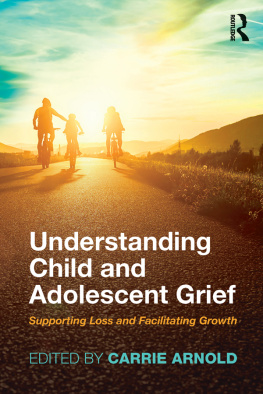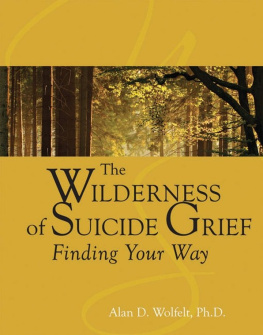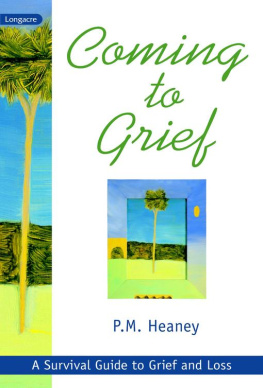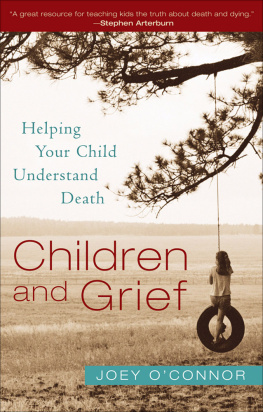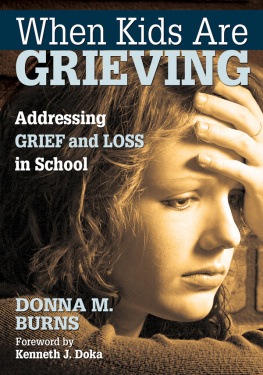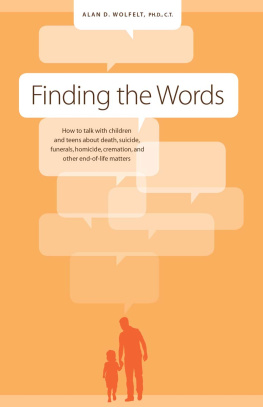Understanding Child and Adolescent Grief
Understanding Child and Adolescent Grief incorporates theory, clinical applications, case studies, and current research on contemporary models of grief pertaining to children and adolescents. The integration of developmental perspectives, attachment theory, and neurobiological implications provides a thorough summary of the many factors that can affect a child's growth and development and the subsequent influence on grief expression. Chapters explore relevant social topics rarely addressed in other texts, such as the death of African American men, suicide among Aboriginal youth in Canada, death/suicide among LGBTQ youth, and social media's influence. Also included are practical tips for helping professionals who want to better understand how grief and loss affect children and teens, as well as a meditation guide that provides concrete opportunities for growth and healing.
Carrie Arnold, MEd, has been an adjunct faculty in thanatology and psychology at King's University College, Western University since 2005. She is a Canadian Certified Counsellor with the Canadian Counselling and Psychotherapy Association and is registered with the Ontario College of Social Workers and Social Service Workers. She has provided psychotherapy and counseling to children, adolescents, and adults since 1999.
The Series in Death, Dying, and Bereavement
Robert A. Neimeyer and Darcy L. Harris, Series Editors
For a complete list of all books in this series, please visit the series page at: https://www.routledge.com/series/SE0620
Understanding Child and Adolescent Grief: Supporting Loss and Facilitating Growth, edited by Carrie Arnold
Sibling Loss Across the Lifespan: Research, Practice, and Personal Stories, edited by Brenda J. Marshall and Howard R. Winokuer
The Crafting of Grief: Constructing Aesthetic Responses to Loss, by Lorraine Hedtke and John Winslade
Attachment-Informed Grief Therapy: The Clinicians Guide to Foundations and Applications, by Phyllis S. Kosminsky and John R. Jordan
Handbook of Social Justice in Loss and Grief: Exploring Diversity, Equity, and Inclusion, edited by Darcy L. Harris and Tashel C. Bordere
When Professionals Weep: Emotional and Countertransference Responses in Palliative and End-of-Life Care, Second Edition, edited by Renee S. Katz and Therese A. Johnson
Techniques of Grief Therapy: Assessment and Intervention, edited by Robert A. Neimeyer
Dealing With Dying, Death, and Grief During Adolescence, by David E. Balk
Bereavement Care for Families, edited by David W. Kissane and Francine Parnes
Grief and the Expressive Arts: Practices for Creating Meaning, edited by Barbara E. Thompson and Robert A. Neimeyer
Techniques of Grief Therapy: Creative Practices for Counseling the Bereaved, edited by Robert A. Neimeyer
Working with the Bereaved: Multiple Lenses on Loss and Mourning, by Simon Shimshon Rubin, Ruth Malkinson, and Eliezer Witztum
Helping Grieving PeopleWhen Tears Are Not Enough: A Handbook for Care Providers, 2nd Edition, by J. Shep Jeffreys
Grief and Bereavement in Contemporary Society: Bridging Research and Practice, edited by Robert A. Neimeyer, Darcy L. Harris, Howard R. Winokuer, and Gordon F. Thornton
Counting Our Losses: Reflecting on Change, Loss, and Transition in Everyday Life, edited by Darcy L. Harris
Understanding Child and Adolescent Grief
Supporting Loss and Facilitating Growth
Edited by Carrie Arnold
First edition published 2018
by Routledge
711 Third Avenue, New York, NY 10017
and by Routledge
2 Park Square, Milton Park, Abingdon, Oxon, OX14 4RN
Routledge is an imprint of the Taylor & Francis Group, an informa business
2018 Carrie Arnold
The right of the editor to be identified as the author of the editorial material, and of the authors for their individual chapters, has been asserted in accordance with sections 77 and 78 of the Copyright, Designs and Patents Act 1988.
All rights reserved. No part of this book may be reprinted, reproduced, or utilised in any form or by any electronic, mechanical, or other means, now known or hereafter invented, including photocopying and recording, or in any information storage or retrieval system, without permission in writing from the publishers.
Trademark notice: Product or corporate names may be trademarks or registered trademarks and are used only for identification and explanation without intent to infringe.
Library of Congress Cataloging-in-Publication Data
Names: Arnold, Carrie, 1980- editor.
Title: Understanding child and adolescent grief : supporting loss and facilitating growth / edited by Carrie Arnold.
Description: New York, NY : Routledge, 2017. | Series: Death, dying, and bereavement | Includes bibliographical references and index.
Identifiers: LCCN 2017023704 | ISBN 9781138740877 (hardcover : alk. paper) | ISBN 9781138740884 (pbk. : alk. paper) | ISBN 9781315164250 (e-book : alk. paper)
Subjects: LCSH: Grief in children. | Grief in adolescence.
Classification: LCC BF723.G75 U53 2017 | DDC 155.9/37083dc23
LC record available at https://lccn.loc.gov/2017023704
ISBN: 978-1-138-74087-7 (hbk)
ISBN: 978-1-138-74088-4 (pbk)
ISBN: 978-1-315-16425-0 (ebk)
Typeset in Bembo
by Keystroke, Neville Lodge, Tettenhall, Wolverhampton
This book is dedicated to Dr. Darcy Harris for her unconditional support, boundless generosity, and unwavering belief in my abilities.
Also, to the students and clients who have provided such inspiration over many years, thank you for all the ways in which you have openly and willingly shared your losses, and your selves.
And lastly, to my children, Olivia and Ethan, for being incredibly gifted teachers. I offer you deep gratitude and much love.
Table of Contents
DARCY HARRIS
CARRIE ARNOLD
CARRIE ARNOLD
STEPHANIE RABENSTEIN
CARINE BLIN AND CHRISTINE JONAS-SIMPSON
EUNICE GORMAN AND CARRIE ARNOLD
ADAM KOENIG
SHEILA ODONOVAN
LISA PEARLMAN
JENIFER FREEDY
REBECCA T. MACHADO
TASHEL C. BORDERE AND JAMES A. LARSEN
KIP G. WILLIAMS
CARLA SOFKA
LINDA GOLDMAN
ADAM KOENIG AND CARRIE ARNOLD
BRAD HUNTER
Figures
Tables
Boxes
Not long ago, children were treated as little adults, and their unique ways of seeing and being in the world were viewed through the lens of adult perspectives and experiences. Obviously, much has changed, both in the understanding of loss and bereavement in general, and of children's navigation through events involving loss and grief specifically.
Understanding Child and Adolescent Grief provides us with a multifaceted view of some of the losses that young people may encounter, exploring these experiences from various developmental, neurobiological, psychological, and sociological perspectives. Common childhood losses, such as the loss of a parent, a sibling, a friend, and the loss of self through a life-threatening health condition, are discussed from the perspective of the child/youth, with an emphasis on specific approaches that provide the supportive care and assistance that may be the most helpful and effective for young people. Case studies are woven throughout the chapters and keep us focused, always, on the voices and unique needs of the children who experience various types of life-changing loss events.

